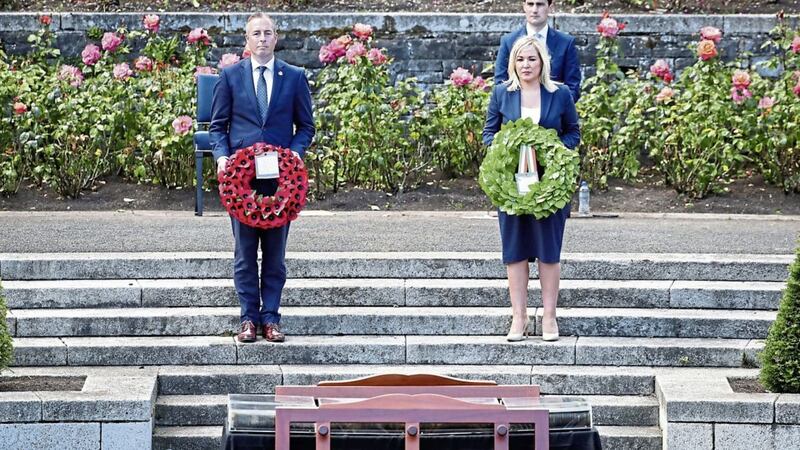IT is a truth universally acknowledged (as Jane Austen might have said) that we are a society divided by history.
But last weekend that truth turned out to be not so truthful, when our First and Deputy First Ministers laid wreaths in Dublin in memory of those who died at the 1916 Battle of the Somme.
Political rivalry between the two ministers pushed them towards using history to claim the high moral ground, rather than displaying a basic (and common) understanding of the causes, nature and tragic consequences of the First World War (WWI).
Which leads us to conclude that what divides us is not so much history, but a misunderstanding of history (deliberate or otherwise) and the exploitation of that misunderstanding for modern political advantage.
We are not prisoners of history, we are prisoners of ignorance and opportunism.
Although the events which led to WWI (1914-1918) were complex, the war itself was initially between two European powers, Britain and Germany, seeking to extend their empires (think of it as Brexit with guns).
As in many wars, the Irish were cannon fodder. Nationalists joined the British army, believing that they would achieve Home Rule (a sort of all-Ireland Stormont, only not quite as hopeless and without the regular collapses). Unionists joined in the belief that it would prevent Home Rule.
Both were slaughtered under false pretences.
Those who died at the Somme might be respectfully remembered not as heroes (although some may have fought heroically) but as victims of a huge British scam.
So when Paul Givan said his wreath was for “all those who gave their lives for our freedom”, he was manipulating history to suggest that the British empire somehow equated with freedom.
This is the same British empire which killed an estimated 150 million people, through the use of concentration camps, mass shootings, torture and famine.
Michelle O’Neill’s script was more carefully worded. She said she was paying her respects to those who lost their lives and claimed that her attendance represented her commitment to “equality and parity of esteem”.
One minister claimed to represent freedom, the other to represent equality.
Givan’s comments were standard unionist rhetoric. O’Neill’s were a departure from the republican teachings of James Connolly. He advocated fighting for Ireland, rather than for either Britain or Germany, as illustrated by his role in the 1916 Rising.
Connolly’s stance is perhaps best expressed in the ballad The Foggy Dew. It was written by Canon Charles O’Neill from Portglenone, later parish priest of Kilcoo, Co Down: ’Twas better to die 'neath an Irish sky, than at Sulva or Sud El Bar (which were British battles in Turkey).
Republicanism argues that those who died at the Somme should be remembered as victims of British duplicity. But modern SF switches from republican rhetoric to equality-speak as the opportunity arises.
This allowed O’Neill to commemorate soldiers who died in the same British army which had executed Connolly eight weeks before the Somme.
Last Saturday, while the DUP were still fighting in the trenches, SF drove a tank labelled “equality” to cross those same trenches, thus winning the Battle of the Somme commemoration.
To consolidate victory and raise the high moral ground even higher, O’Neill said: “Obviously I don’t agree with wars". Of course not (don’t mention the IRA’s 30 year war). Not only was SF not in the trenches, it was even against war, leaving the DUP without an enemy.
So the party which claims direct lineal descent from Easter 1916 shelved the Rising and commemorated the Somme dead, many of whose surviving comrades arrived here a few years later as Black and Tans.
That’s the great thing about Irish history. It can be moulded like children’s Plasticine and reshaped as modern politics requires.
So we are not divided by history. We are united by our ability to mould it - and the British government’s latest legacy proposals suggest that demand for Plasticine from all sides will rise sharply in the weeks ahead.








